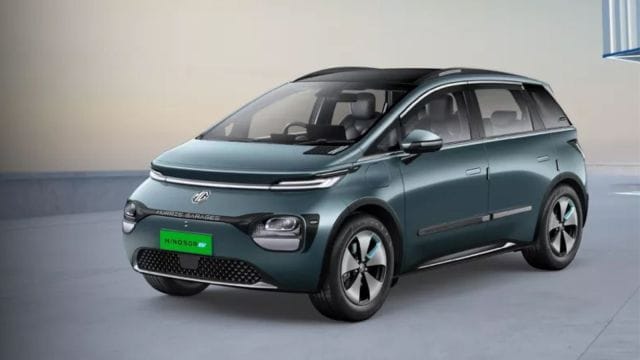JSW MG Motor India expects one in every three of its new electric vehicle — Windsor EV — to sell under its novel Battery-as-a-Service, or BaaS, model in the coming months as it ties-up with more financiers for offering the car under this new scheme. The BaaS model currently accounts for around 15 per cent of Windsor’s sales. The car, MG’s third EV, has already crossed the 10,000-sales mark in three months, with 18,000 orders in backlog, according to a top company official.
This could be significant for two reasons: A rush for an EV model at a time of flagging demand in this segment, as also that much of this demand is coming from tier-3 and tier-4 towns such as Panipat, Sonipat, and Bathinda. With BaaS, the company—owned by SAIC Motor and JSW Group—believes that it has found the optimal route to deepen EV penetration in a price-sensitive market like India.

What is BaaS
Put simply, BaaS is a subscription plan for EV batteries. It allows the Windsor to be offered for sale at a lower upfront price by excluding the battery price. The customer pays for the battery under a monthly pay-per-usage plan. As the battery typically costs between 40 and 50 per cent of the cost of a topical EV, by taking the battery out of the initial price of the vehicle, BaaS significantly reduces the upfront cost of EV ownership. The company has tied up with financiers and offers flexibility in payments to customers opting to buy the car through this route. Customers have the choice of buying the car with the battery as a bundled product at a price starting at around Rs 13.5 lakh, as against the Rs 9.99 lakh starting price tag under the BaaS scheme.
Story continues below this ad
“It’s a very unique thing (BaaS model), especially for India. If you take Windsor, we are saying (its price is) Rs 10 lakh plus battery. The battery rental as well as charging costs put together, is 50 per cent of petrol cost. So, you spend less on maintenance (than a petrol-fuelled car) and the acquisition cost is Rs 10 lakh. In Rs 10 lakh, if you have to buy a car, you will typically buy a small car. But here you’re getting a big car, like a (Hyundai) Creta-sized car… So suddenly the whole concept changes,” Rajeev Chaba, the now CEO Emeritus of JSW MG Motor India told The Indian Express at a recent interaction. Chaba was earlier the President and Managing Director of the company.
While MG says BaaS is a battery rental scheme, in essence, it is a finance scheme for the battery. BaaS has enabled the company to offer the Windsor at an aggressive starting price of Rs 9.99 lakh, ex-showroom. The battery rental is 3.5 per kilometre for a minimum monthly usage of 1,500 km, which varies according to the option of financiers and goes up with the mileage clocked on the car.
Pushing EV adoption
According to Chaba, the lower upfront cost that the BaaS model facilitates has helped the automaker to convert customers of conventional cars into buyers of EVs.
“That is why we are now seeing petrol heads, the guys who never thought about EVs, they are looking at EVs. That’s how we have sold 10,000 cars in three months, and still we have more than 18,000 orders in backlog. In EVs, nobody has seen this kind of rush. And the good news is it’s not from cities like Delhi or Mumbai. We are getting demand from tier-3 and 4 cities. People in places like Panipat, Sonipat, and Bathinda are getting converted to EVs. That’s a very pleasant surprise, and that gives you hope that EV penetration can increase if you have good, compelling products,” Chaba said.
Story continues below this ad
MG initially launched the scheme in partnership with two NBFCs—Hero Finance and Bajaj Finance—and two financing start-ups. It will soon join hands with banks, including ICICI, State Bank of India, IDFC First, and Kotak Mahindra.
“Once they join, I think (BaaS) penetration may go up to 35-40 per cent,” Chaba said. “The point is more than the penetration, what happens is that suddenly the customers realise that the whole cost of ownership of EV is Rs 10 lakh plus petrol…people are now considering buying an EV, thanks to these kinds of offerings.”
Cost of ownership
Under the BaaS scheme, ballpark estimates show a minimum monthly charge of around Rs 5,250 has to be paid by the customer, plus any additional charges for distance higher than the 1,500 km. These charges are typically higher for the start-up financier that MG has tied up with. Plus, there is the cost of charging the battery, though MG has a scheme to mitigate the charges for a limited period if the customer were to use public chargers. According to Chaba, the cost of petrol for similar runs would be notably higher than the monthly charge under BaaS plus the cost of charging the battery.
While BaaS is what MG appears to be betting on for the India market, the future of EV battery subscription may even include swappable batteries serviced via large battery swapping stations. But that appears to be at least a few years down the line.
Story continues below this ad
“Our model is a very unique model in India. We are saying that your battery can be financed separately. But swappable batteries…That’s the next stage, if you wish. If, suppose we get volumes, then we can think of having battery swapping stations in big cities, as an example. So, I won’t rule out battery swapping stations in future,” Chaba said.


































